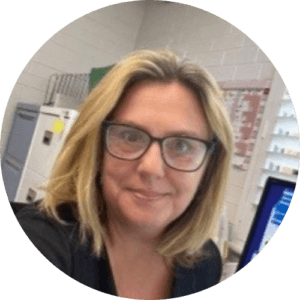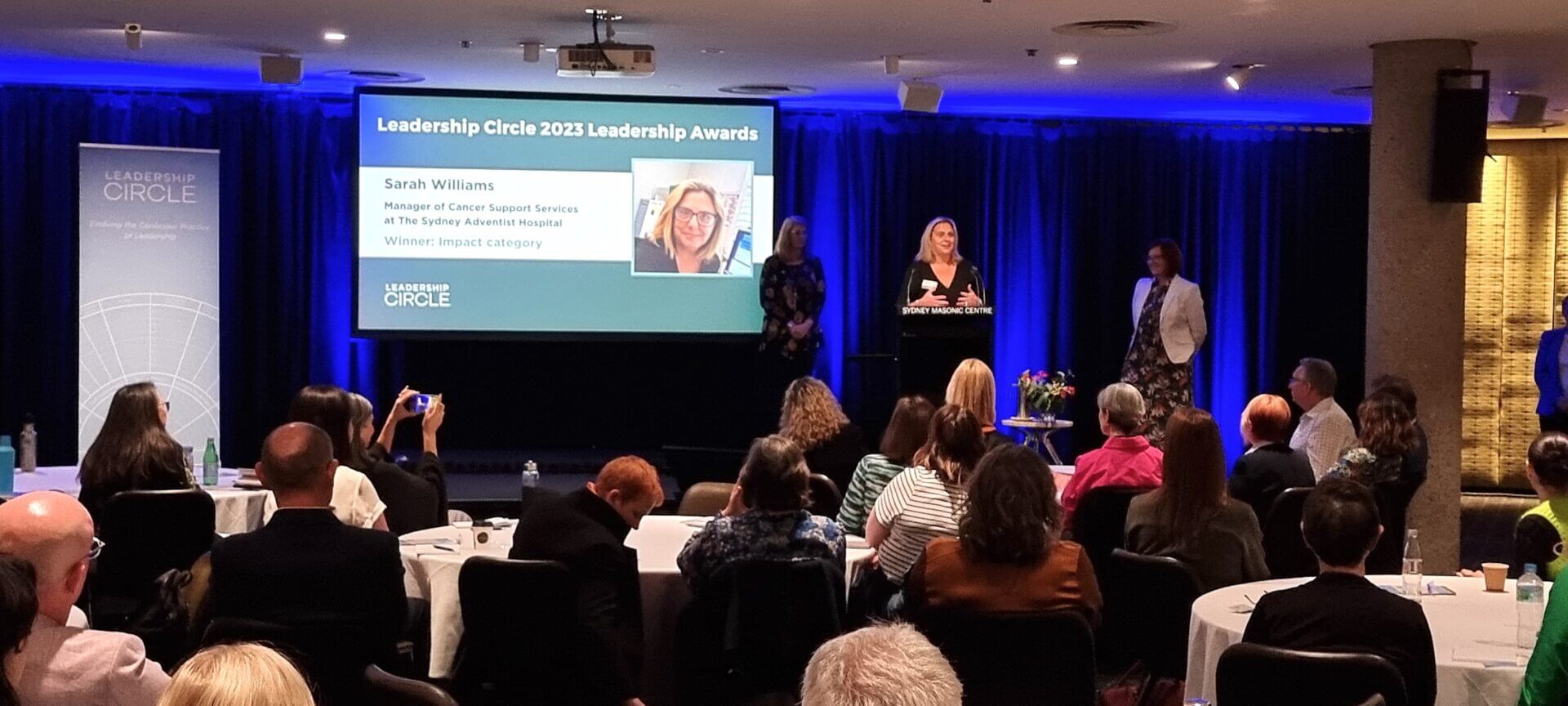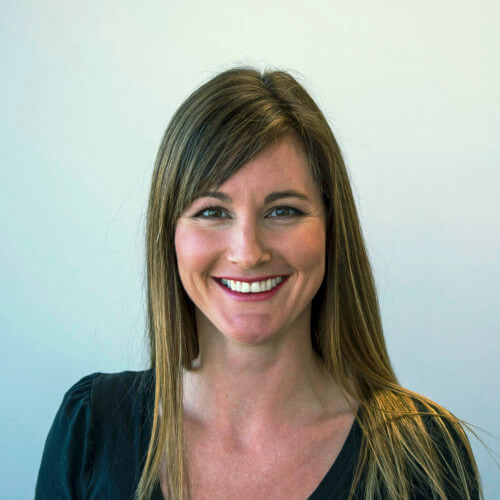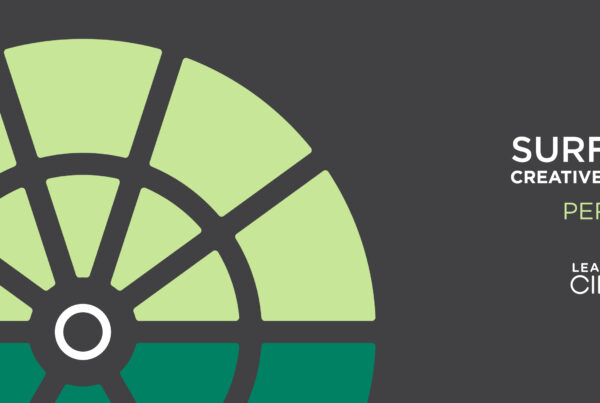How Impact Award Winner & Healthcare Leader Sarah Williams’ Career and Leadership Evolved From Law to Cancer Support and from Manager to Leader

Sarah Williams
Sarah Williams is a healthcare leader in Cancer Support Services at The Sydney Adventist Hospital. She is the recipient of the Impact ANZ Leadership Circle Award 2023, which recognises exceptional leaders who have a big impact on people and organisations achieving important goals.
In conversation with Leadership Circle, Sarah shares how her career journey took her from studying law to marketing international hotels, to her dream role managing Cancer Support Services and helping cancer patients thrive—with a trip back to her academic roots in family law and a stop managing a healthcare team during COVID-19 in the process.
Sarah discusses her invaluable leadership experiences and lessons learned along the way, how the Leadership Circle Profile helped transform her from a “manager” to a “leader,” and how she enabled her team to excel in providing incredible outcomes helping patients.
LC: Can you tell us about the origins of the Cancer Support Centre at Sydney Adventist Hospital?
SW: It started about 30 years ago and it was very much ahead of its time. Nobody in Australia had thought of the emotional and psychosocial impact on cancer patients. There were no courses, groups or treatments to support people on their journey. So, some visionary leaders started the Cancer Support Centre 30 years ago in a little cottage with some support groups and wig libraries. It was very small, literally a cottage industry!
LC: How did you come into your role leading the Cancer Support Centre?
SW: I first came to know Cancer Support Centre when I came back to work after a career break having my children. I’d previously been in marketing for international hotels which was a very different lifestyle.
I wanted to come back in a smaller capacity at first, doing something that had an impact in the community my children were going to be living and growing up in. So I found myself as the coordinator at the Cancer Support Centre and I fell in love with it and everything that was done here.
After a little while, I decided to progress my career. I decided to go back to my qualifications, which were in law, and I went to family law. People said to me, “how will you handle family law?” And I said, “I can do that, because I’ve been dealing with the sad stories of cancer patients for the last four or five years”.
With cancer support, you see the absolute best of humanity and love and family and everybody was trying to live as long and as well as they could. Every family and loved one was trying to support that. Although we obviously get some very sad stories as well, it’s an incredibly uplifting and satisfying area to work in because of the love that people show each other and the kindness and the generosity of groups. As soon as I reach out, if we’re holding an event or something, people hear it’s for cancer patients and they give. It’s quite humbling to be a part of.
About 18 months ago, I was given the opportunity to manage the Cancer Support Services at the hospital including the Cancer Support Centre, which I jumped at. I was really thrilled. I’d always wanted to come back.
LC: How did you find taking the reins of leadership at the cancer centre post COVID-19?
SW: We’d had an incredible manager while I was here previously who had taken it from the cottage industry and moved it into the early 2000s, and developed lots of different programmes and support services. Then Covid hit.
We had a number of acting managers who were doing their best during a time that was quite horrific for people who needed support due to cancer, because when lockdowns finished for everybody else, they certainly didn’t finish for cancer patients. So many of our services were stopped and so many were on Zoom, which just didn’t have the same impact.
I had this incredible privilege 18 months ago to come in with almost a clean slate. I felt an incredible responsibility for the vision and the work that previous people had put into this centre and the desire for the doctors, nurses, and patients to have all these services.

Sarah Williams accepts the 2023 Impact Award
LC: How did you feel about receiving a Leadership Circle Award?
SW: I feel like it was an award for my team. I was given an incredible team of administrators, counsellors, volunteers, and clinical patient navigators.
I think if I’d received it prior to doing the Leadership Circle Profile with Kristyn (Kristyn Haywood, Sarah’s leadership coach) and prior to leading the team that I lead now, I probably would’ve thought, Oh yes, that’s a great award. And I worked very, very hard, so I deserve that award. But Kristyn, through the Leadership Circle dynamic, taught me so much more about what leadership is, and it was such a beautiful synergy and timing in my career in that I was given the opportunity to lead the team that I’m leading, which is without doubt the most amazing team I have ever led.
LC: How has Leadership Circle helped you achieve your goals as a leader?
SW: Before, I’d always been like a mom for the team, so if there’s a problem, I’m going to fix it. With Kristyn’s guidance and mentoring with the Leadership Circle Profile, I very much felt that I needed my team to grow with me rather than just fix problems. The leader really is only as good as their team.
We’re working on the concept of managing versus leading. I managed before, but with Kristyn’s guidance and the Leadership Circle Profile, I feel like I’m able to lead. I’m able to inspire people and initiate things. The team wants to come on that journey, and I want to be with them on that journey. Working together and making a safe space for the whole team to bring in ideas [allows us to] openly communicate. Now, we can actually bring things up and say, Well, that’s actually not going to work because of this, this, and this, but could we [approach it from] a different angle? I probably wouldn’t have done that in the past.
LC: How has using the Leadership Circle in your organisation helped with innovation and growth?
SW: We’ve tripled the amount of people that come through the centre. We’ve started four or five new support groups for cancer streams. We’ve got different therapy programmes.
People need different things. Some people just want to come and chat one-on-one with a counsellor. Some want to go to a support group. Some need help socially and emotionally through this journey, but don’t want to just sit and talk. So, we do a lot more activity therapy, like mindfulness photography and crochet circle. People are doing something while they’re talking, so they don’t actually realise that they’re talking, but they’re getting the great benefit of talking. We’ve grown tenfold over the last year, and we’ve got so many grateful patients because of that.
Our patient navigators are incredible. We now have cancer patient navigators for breast, prostate, GI, and gynaecological cancer who can refer people to different services, answer their clinical questions, and make sure that they’re thriving through cancer. That’s what we ultimately want to achieve.
LC: What are the big goals you’re all working towards at the Cancer Support Centre?
SW: Our biggest fundamental goal is that nobody goes on their cancer journey alone. We want everyone to be able to identify something that will work for them in all our different therapy programmes. And we want them to think that they can thrive during their cancer treatment. Even for people with metastatic and terminal diagnosis, they can still have life goals, and thrive while they’re here. We’re not pretending that everything’s rosy all the time. But we’re trying to find beauty even in the chaos.
LC: And finally, can you share what you’ve been most proud of in your career?
SW: The thing that I’m most proud of in my career is when I managed a primary care healthcare team in the hospital, and I headed up the vaccination rollout in the LGA during covid. The team was under incredible stress. It was before anybody had vaccinations, testing wasn’t widespread, and nobody had any understanding of what covid would do. We were all coming into work each day when everybody was in lockdown. We didn’t know if people turning up had covid, if we were going to be taking it home to our families. It was a scary time.
It was a very isolating time in healthcare. When the vaccines came out, it was just so fast, so busy. People were very stressed calling us, wanting vaccines and appointments. Government guidelines were changing daily. We would find out as the public found out, there was no advanced notification to the primary health networks.
My team went from handling 200 – 250 phone calls a day to 700 with the same amount of staff. We did over 10,000 vaccinations. The team were doing very long hours. It was isolating, hard work, and it was judgy work: There were people that didn’t like the vaccines, people that thought they should be getting more vaccines. A lot of opinions. We were so desperate to reach 80% vaccination rate so that people could go out in the community. I will be endlessly proud of what we did for our community during that time.
Learn more about Sarah’s journey in Part 2 of our conversation, where Sarah shares her insights and reflects on the leadership lessons she’s learned.
Learn more about the Leadership Circle Profile and how it helps leaders and their teams to do their best work and achieve impactful goals.

As APAC head of marketing, Anna Chatburn shares the power of Leadership Circle products and services with leaders in the Asia-Pacific region. With a background in marketing for professional services and environmental organizations, she believes in value-driven marketing that leads positive change in the world. Leadership Circle encapsulates many of the topics she has interest and experience in, such as personal and professional development, psychology, consciousness, and sustainability. Anna enjoys getting to share her enthusiasm to help leaders find and benefit from Leadership Circle to make a bigger impact in their work.





This post hit home for me. Thanks for writing it.